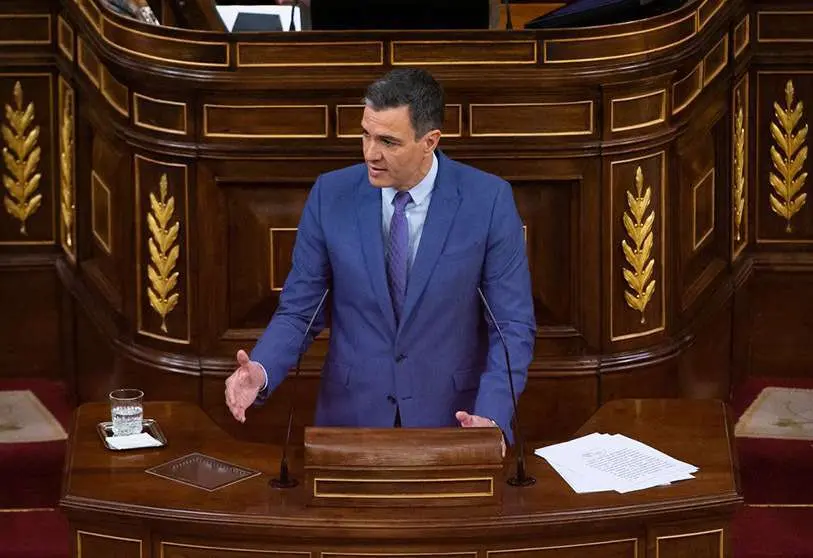Sánchez defiende en el Congreso el cambio de postura sobre el Sáhara

The President of the Government, Pedro Sánchez, has explained on Wednesday from the rostrum of the Congress of Deputies the change in Spain's position on the issue of Western Sahara almost three months after the Royal House of Morocco revealed the content of the letter sent by the President to King Mohamed VI, in which he defined the proposal for autonomy under Moroccan sovereignty as the "most serious, realistic and credible" basis for the resolution of the dispute.
Sánchez defended his position in the lower house and acknowledged the government's U-turn on the pending issue of Spanish foreign policy, a turn that has not been supported by the rest of the parliamentary groups, nor has it received the approval of part of the executive branch itself. The aim, according to Sánchez, is to defend Spain's interests and find solutions to a conflict that has dragged on since 1975, 47 years ago.
"We fervently desire this solution and we will do everything possible to bring about a solution", said the president during his parliamentary address, before adding that Spain's diplomatic efforts "go hand in hand" with the commitments made by the European Union and the United Nations. The conditions for the resolution of the dispute must be acceptable to all parties involved and within the framework of the UN, Sánchez stressed.

The president compared Spain's new position on the Western Sahara issue with that adopted previously by its international partners: 'France supports Morocco's proposal, in the same way that the German president recognised that the Moroccan proposal is serious and credible, as did the United States, and the Netherlands joined in this position in May'.
During his appearance, Sánchez presented the arguments underpinning the Spanish government's decision to back the Alawite Kingdom's proposal in Western Sahara. Firstly, the turbulent geopolitical scenario as a result of the Russian invasion of Ukraine, which forces the international community "to roll up its sleeves and resolve chronic conflicts". Secondly, the guarantee of the territorial integrity of Ceuta and Melilla.
The Spanish government's manoeuvre leaves "beyond all doubt", according to President Sánchez, the Spanish sovereignty of the autonomous cities. "We have made a commitment to mutual respect whereby, in our political discourse and practice, we will avoid anything that offends the other party". "We do not accept that Ceuta and Melilla should be spoken of as occupied cities because they are Spanish and European territory, internationally recognised", the head of the Spanish government said.
The President of the Government responded in parliament at the request of the Popular Party (PP), the main opposition party, two months after holding an audience in Rabat with the Alaouite monarch, Mohammed VI. That 30-minute meeting served to put an end to the diplomatic crisis that broke off bilateral relations between Morocco and Spain for 10 months as a result of the admission 'in pectore' to a hospital in Logroño of the leader of the Polisario Front, Brahim Ghali, suffering from COVID-19.

Sánchez extolled the virtues of a turnaround that has served to rebuild relations with Morocco. For the time being, Madrid and Rabat are working on a common roadmap outlined in the joint statement issued at the end of the meeting between Sánchez and Mohammed VI, which he attended accompanied by the Minister of Foreign Affairs, José Manuel Albares. "A new framework of understanding" that has so far facilitated the reopening of borders and the resumption of Operation Crossing the Strait, among other points.
The parliamentary arc, from left to right, has charged against Sánchez and harshly questioned his change of position. PP spokesperson Cuca Gamarra demanded a return to "active neutrality" on the dispute. The pro-independence groups have accused the president of abandoning the Sahara and betraying the Saharawi people. But the harshest criticism has come from within the government, from Unidas Podemos (UP).
"Morocco deserves the same consideration when we talk about the issues that concern them", said Sánchez, who briefly detailed the government's position in a session in which other foreign policy issues were addressed, such as the ramifications of the war in Ukraine and the recent sixth round of sanctions against Russia approved by the European Council.

The Socialist leader vindicated Spain's role in a conflict "that is so much our own, in which we are so directly involved" and which damages relations "between two partners such as Morocco and Algeria". Spain's responsibility, according to Sánchez, is to "do everything in our power to contribute to a solution that in the end will be something that the parties will have to agree".
Sánchez's appearance coincides with the judicial investigation into the case of the Pegasus spying on the president and several members of the Council of Ministers, including at least the Minister of the Interior, Fernando Grande-Marlaska, the Minister of Defence, Margarita Robles, and, probably, the former Minister of Foreign Affairs, Arancha González Laya, Albares' predecessor, who was replaced in an attempt to ease relations with the Alawi Kingdom.
But Sánchez has made it clear from the rostrum of Congress that the change of direction on the Sahara issue is not related to the 'Pegasus case' or to his terminal being infected with this 'spyware' in the face of the doubts expressed by the spokespersons of the main parliamentary groups.








